Wake Forest Radio History - 1970s and 1980s
Don Kobos ('70, MA '74)
Assistant News Director, KTRK-TV, Houston, TX
When I was an undergrad (1966-70) I paid absolutely no attention to WFDD-FM. Why would a Deacon football student-athlete be interested in classical music? I did think about a career in TV or radio news and sports but at that time there were no television or radio broadcasting courses to take.
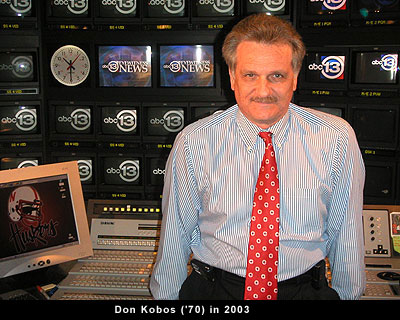
But after two years of teaching and coaching I discovered the speech communications department when I enrolled in the Wake Forest Graduate School. It was advisor Dr. Merwyn Hayes who pointed me to "the radio voice of Wake Forest University."
WFDD-FM was like a drug for me. Between classes or whenever I had time, I'd head over to the Reynolda studios to learn and play. The irony for me I ended up producing and hosting a classic music show entitled SHOWCASE.
My football training was good for something. I lugged a giant audio recorder with microphones and stands out of the studios and up and down the stairs in Reynolda Hall a couple nights a week. After recording live classic music performances, I'd return to the studio and put it all together editing, writing and announcing for the show.
I even performed in an opera thanks to WFDD. The National Opera Company was performing in Winston-Salem one night. Someone from the touring company called over to the station looking for extras to dress in soldier's uniforms and walk on stage during several songs. Did I know the words to the opera? Heck no, I couldn't even spell opera! We were told to just make like we were singing. I did and was paid as I walked off stage.
Honestly, I learned all the little things at WFDD that have helped me during my 30 year news reporting and television career. Even understanding classic music helped because it provided me with an appreciation for diversity in every aspect of life.
Don Kobos (1970-BA, 74-MA) was a television reporter for 26 years. For the last four years he's run the day to day news operation as assistant news director at Houston's highest rated news operation, KTRK-TV, the Disney owned station in Houston, Texas.
-- Posted 2003
Dick Norris ('71)
My four years at "Big FUDD" were some of my most memorable times at WFU. After my freshman year, I practically lived in the studios.
I remember flipping the control switch for the very first broadcast of "All Things Considered" when we initiated our affiliation with this new network called NPR (still a regular part of my daily routine!). I also remember launching a new morning program called Renaissance (1970, I think), and the dramatic turnaround of Deaconlight from Andy Williams and Frank Sinatra to Cream and Zappa's The Mothers of Invention in one short year! We produced a weekly public affairs program that was very well done - "Sounds of Winston-Salem" was its title, I think. And of course the sports remotes were always a kick.
Teriffic memories come to mind when I think of the great people I worked with, including Tink, Dr. Burroughs, Ken Johnson, Frank Donaldson, Steve Oviatt, Bill Beerry, George Bryant, and so many others.
After WFDD, I continued work in radio with the CBS affliate in Roanoke, VA, before moving to Oregon in 1974. I worked for Oregon Public Broadcasting for a few years in the late 70s, but eventually found my way to a career in teaching.
I continue to value public radio and cherish the memories of the great fun we had and the great accomplishments we experienced as staff members with WFDD.
-- Posted 2003
Bill Beery ('73)
Steve Oviatt ('73)
WFDD helped me fulfill a career goal and allowed me to meet and know some fantastic people. After my years at WFDD, I worked as a Staff Announcer and Reporter for WJOY-AM/WQCR-FM for 10 months before moving on as a Reporter/Producer for WCAX-TV - all in Burlington, Vermont until 1981. I was nominated for a Peabody Award for my coverage of the 1980 Quebec Separatist Referendum while at WCAX. In 1981, I entered the high tech industry with Digital Equipment Corporation. In my spare time, I hosted a weekly call-in show on Vermont ETV and was backup staff announcer until 1985. Then I moved to the Boston area where I was a Producer/Director for industrial television while still with Digital. Since 1992, I have worked as a consultant with a number of high tech firms, specializing in call center technology.
-- Posted 2003
C.B. Baker Tharp ('74)
From 1971-1973, I was the "opera jock" for the live Saturday broadcasts of the Metropolitan Opera. I also rode the board for the broadcast of the Deacon baseball games. I produced "Focusing on the Arts," a weekly arts program (interviewed Agnes De Mille twice when she was setting the choreography on the American Heritage Dance Theatre troupe at the School of the Arts; interviewed Joe Melziner when he was designing our "new" theatre complex). I also produced a program called "This Fair Land of Ours, North Carolina" in collaboration with local history educators for in-class listening in the North Carolina Public Schools. We actually produced our own sound effects in the studio on Saturday mornings. What a wild ride! We won a regional programming award for that one.
-- Posted 2003
Jay Banks ('74)
Wally Boyd ('74)
Helen Bryant Anders ('74)
Well, what we called ourselves back in the mid-70s was Phi Nu. Jay Banks will remember why. Sure wish I coulda been there for the reunion, even though I didn't work very much at WFDD; I edited Old Gold. My boyfriend at the time, Drew Joyce, was big at WFDD, and I hung out there. I did spent one entire winter term (we used to have one of these -- took up the month of January and was so much fun it was quickly abolished) at WFDD participating in a group project headed by Tom Phillips (now an admissions guru) producing "The Hobbit" for radio. Some of us also did a weekly radio opera, the Soap Family. I was the wife, Palmolive. I remember that I had a dog Ajax and a son Borax. Or maybe it was the other way around. All of this ran during Deaconlight, of course. So many memories. My appendix even ruptured up there.
-- Posted 11/20/2003
Michael Miller ('74)
Keith Young ('74)
TV and Video Production for Wachovia
Wake Forest and WFDD did so much for me in my career as a broadcast journalist. I worked in radio and television news jobs from 1974 until 1994. The broad, liberal arts education I received at Wake Forest gave me a little knowledge about a lot of different things and I found that broad base to be most beneficial as I covered everything from local police departments to presidential campaigns to debates over issues in the North Carolina General Assembly. WFDD was a wondferful learning experience. It gave me the confidence to pursue a career.
I left the broadcast news business in 1994 to go to work for First Union Bank (now Wachovia.) My current position is Vice President and Senior Producer for Wachovia's internal employee television and video production department.
-- Posted 2003
Bill Satterfield ('75)
Executive Director, Delmarva Poultry Industry, Inc
My years at WFDD from 1973-75 had a great deal of influence on my life. Upon graduation I started as an announcer with a Dover, Delaware, AM radio station before moving to news reporter/broadcaster there. After five months I was promoted to News Director, a position I held for eight years. I had opportunities to work with all segments of newsmakers in Delaware - governors, federal elected officials, local elected officials, judges, and business leaders. I hosted a telephone call in show and was a high school sports announcer.
In Salisbury, Maryland, I became became a farm news reporter, probably the only one with a WFU degree. That led me to the trade association for the local broiler chicken industry. At present I am executive director of Delmarva Poultry Industry, Inc.
-- Posted 2003
Tom Cloud ('76)
Attorney
I don't know if you'd call the law a "career in broadcasting" but I think that working at WFDD helped. When you gaffe before a multitude of listeners, you lose any fear of presentations or arguments before judges, commissions, or legislative committees. Outside of the Debate Team at Wake, working at the radio station was probably the best experience I could have had for public speaking.
-- Posted 2003
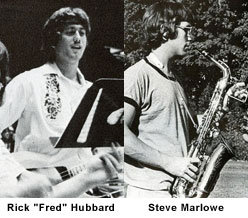 "Fred" Rick Hubbard ('76) "Fred" Rick Hubbard ('76)
Brian Lewis ('77)
Steve Marlowe ('77)
Steve Pendlebury ('77)
Director, AOL News
My days in front of a mike began long before I got to Wake Forest. There was an AM station in town that gave our school an hour of air time every Wednesday night. We did a show that, at least in my foggy recollection, seems like a primitive version of Deaconlight. I even ran into the guy who first put me on the radio - before that high school show. He was an electronics wiz - and still is. Back when we were in junior high, he built a small AM transmitter that was totally overpowered and illegal. Under the right conditions, you could get the signal as far away as New Jersey! I reveal this to you because I don't need my 3rd class license now and I'm sure the statute of limitations has expired. But I'm sure the FCC would not have been amused ;-) So it was in this guy's laundry room, in a makeshift studio playing a format that, as I remember, had Hendrix and Black Sabbath in heavy rotation, I learned to get over mike-shyness and cue up a record. Radio got into my blood way back then.
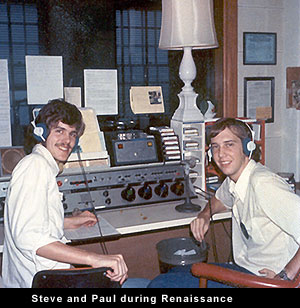 Knowing that, you can image what I thought when I walked into WFDD for the first time in 1974. A 36,000 watt, state-of-the-art (well, as far as I knew) FM stereo NPR affiliate. And the people who ran it were going to let me do pretty much anything I wanted to do with it. They'd even pay me to work there. Yow! Fred Hubbard mentioned the same thing during our reunion dinner. I'll bet a whole lot of us had that experience the first time we went into the station. They might as well have called it Creativity Lab. I took the radio practicum course and the FCC license test as quickly as possible so I could be part of the Big Fudd staff. I probably spent more time at the station than anywhere else during my years at WFU. I have fond, vivid memories of late nights in the production room - working furiously over one of the Scully decks with a razor blade and splicing tape - surrounded by friends who got the same kick out of doing this crazy stuff. When we listen to those tapes today, as Paul Ingles so astutely observed, some aren't as good as we remembered. But some are even better. We all fed off each other's creative energy. We taught each other so much about radio, work, friendship and life. Knowing that, you can image what I thought when I walked into WFDD for the first time in 1974. A 36,000 watt, state-of-the-art (well, as far as I knew) FM stereo NPR affiliate. And the people who ran it were going to let me do pretty much anything I wanted to do with it. They'd even pay me to work there. Yow! Fred Hubbard mentioned the same thing during our reunion dinner. I'll bet a whole lot of us had that experience the first time we went into the station. They might as well have called it Creativity Lab. I took the radio practicum course and the FCC license test as quickly as possible so I could be part of the Big Fudd staff. I probably spent more time at the station than anywhere else during my years at WFU. I have fond, vivid memories of late nights in the production room - working furiously over one of the Scully decks with a razor blade and splicing tape - surrounded by friends who got the same kick out of doing this crazy stuff. When we listen to those tapes today, as Paul Ingles so astutely observed, some aren't as good as we remembered. But some are even better. We all fed off each other's creative energy. We taught each other so much about radio, work, friendship and life.
Dr. Burroughs and Tink also taught us a lot, although none of us would admit it at the time. Whether it was watching your levels, coiling cable correctly or sounding "professional," those lessons stuck with us, too. In my case at least, they were part of the foundation that helped me get as far as I have in the wide, weird world of media. It just took a lot of years for me to see all the connections. But even when we were still at FDD, I had the sense that it was a profoundly important experience for me. It set me on a career path that led from that pirate station in the laundry room to a key position in the newsroom of the world's biggest Internet service. It's not something I could have planned for or even imagined when I was at WFDD. But somehow, one thing always led to another and the things I learned on each step of the way helped me take the next step.
Because of WFDD, I was able to tell prospective employers that I'd been on the air for years, supervised a staff, produced pieces for NPR and felt at home with every style of music from classical to jazz to rock 'n' roll.
The only thing I didn't have much experience with - except for doing an "All Things Considered" parody for one of the year-end banquet tapes - was news. WFDD didn't have a news department at the time. I did take Bynum Shaw's Intro to Journalism course. All I remember about that is struggling to write a good lead and listening to him tell amusing newsroom tales. I think I got out of there with a solid C. That was the extent of my formal news training. I just wanted to get back to the station for more music and comedy.
So, of course, I ended up as a newsman.
Much of the credit or blame for that must go to our fellow Big Fuddster, Al Hinman. During my final semester, while I was still student station manager, Al helped me get a part-time job at WTOB in Winston-Salem. We both worked in the news department and I would fill in as a DJ on occasional late-night weekend shifts. Sometimes I'd have to dash back to campus from the Top-40 AM world and jump into the persona of classical music announcer or laid-back FM alternative rock dude for the next shift on FDD. There's nothing like learning by doing. It was great to have the opportunity - and youthful energy - to do so much in such a short time.
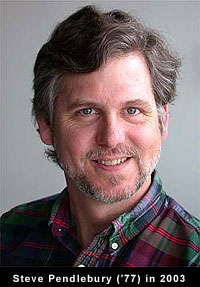 One of the local reporters I met while working for WTOB eventually hooked me up with WRQK in Greensboro, where I ran a one-and-a-half-man news band for a mercifully short time - until a job opened up at WSOC in Charlotte. Being in Charlotte was like a college reunion. Paul and Keith Young were already working there by then and so was Al, I think. (I'm having a senior moment here. Paul - is that right?) Anyway, I DO remember all of us - and many other Pub Row denizens - wasting lots of time at Al's place on Lake Norman during those years! One of the local reporters I met while working for WTOB eventually hooked me up with WRQK in Greensboro, where I ran a one-and-a-half-man news band for a mercifully short time - until a job opened up at WSOC in Charlotte. Being in Charlotte was like a college reunion. Paul and Keith Young were already working there by then and so was Al, I think. (I'm having a senior moment here. Paul - is that right?) Anyway, I DO remember all of us - and many other Pub Row denizens - wasting lots of time at Al's place on Lake Norman during those years!
Because WSOC's AM side ran an all-news format back then, I was constantly feeding stories to the Associated Press bureau in Raleigh. That's how I found out about an opening they had for a broadcast news wire editor at AP headquarters in New York. They moved that whole operation to Washington a couple of years later to merge the desk with the AP Radio network. Suddenly, I was back on the air. I tried to bring the creative style we developed at WFDD to the programs I hosted and produced for AP.
After 10 years in that shop, I went across town to help Reuters start their own news report specifically for broadcasters. By the mid 90's there was a growing need for news delivered to online clients. So we adapted what we did for the broadcast and newspaper wires to meet that new demand. To tell you the truth, we didn't really know what we were doing. Fortunately, our clients didn't really know what they wanted either. So we made our way along in this "new media" world by trial and error. It worked out well enough to land me at AOL, which is now ranked as the most-visited news destination on the Internet. As deputy managing editor, I direct the day-to-day news coverage, bringing together elements of radio, TV, print and online media to tell news stories in a unique way.
It's been a long, strange trip from WFDD to here. But on the best days, I get the same sense of creative fulfillment I used to feel during those late nights in that remote corner of Reynolda Hall.
-- Posted 2003
Dave Sizer ('77)
Paul Ingles ('78)
Producer, Reporter, Audio Engineer, Oral Historian
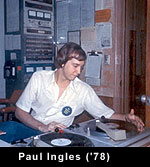 WFDD was fabulous preparation for launching a career in radio. Whether we were hosting a classical music shift, a rock music show, or a sports broadcast, we learned we had to be on time, prepared, and respectful of high quality broadcast equipment - which of course, we were trained to use. Some of the people I met through WFDD have remained my closest friends throughout my life. Also, not insignificantly, much of the most important music of my life, I discovered at WFDD. WFDD was fabulous preparation for launching a career in radio. Whether we were hosting a classical music shift, a rock music show, or a sports broadcast, we learned we had to be on time, prepared, and respectful of high quality broadcast equipment - which of course, we were trained to use. Some of the people I met through WFDD have remained my closest friends throughout my life. Also, not insignificantly, much of the most important music of my life, I discovered at WFDD.
Since my years at WFDD,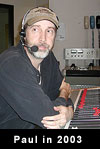 I've worked at radio stations, television stations and newspapers in Charlotte, NC; Cleveland, Ohio, and Albuquerque, NM, including eight years as Production and Training Director at KUNM, public radio at the University of New Mexico. I've worked at radio stations, television stations and newspapers in Charlotte, NC; Cleveland, Ohio, and Albuquerque, NM, including eight years as Production and Training Director at KUNM, public radio at the University of New Mexico.
In 2002, I left KUNM to pursue free-lance work and now run both a for-profit production company, Cedar Creek Studios, and a non-profit media organization, Good Radio Shows, Inc. I frequently contribute to National Public Radio programs.
-- Posted 2003
Lou Tilley ('78)
Sportscaster, CN8, Philadelphia, PA
Class of 1978.. Politics major... thought i was headed to Law School (whew)... HOPED I was headed to pro football (whew)..
Out of Philadelphia (the center city... row house kid)...on to Wake as scholarship jock - football..middle linebacker..
WFU was having only a marginal effect on "my life as a jock," when a very serious injury to my left knee put the future use of my left leg in jeopardy. Forced to drop out of classes for almost two semesters for follow up surgery(s) and heavy rehab... a combination of having a lot of depressed down time, and the input of some very nice, concerned faculty (Jon Rinehart - Politics) and friends (Paul Ingles and former WXII sportcaster Gene Overby) lit a lamp of an idea in my head.
I walked through the door of WFDD, Paul at my side, and started to spend long nights (and days) at the old production board, straight edge razor in hand, learning the art of production that still serves me to this day.
At the same time, I convinced my old coaches, and then the athletic director, to give me a chance to comment on my team - and teamates over the air - and quickly earned the full-time role of "Color analyst" on WFU football broadcast, while still a student.
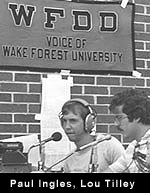 Had I stayed ONLY with the live events work, however, I never, and I mean never, would have found the career that developed. Had I stayed ONLY with the live events work, however, I never, and I mean never, would have found the career that developed.
WFDD introduced me to important elements of production, writing, editing, and imaginatitive tools.
It also introduced me to an entirely new circle of friends, who accepted me as more than a "jock," and who encouraged me to develop my confidence - to use some flicker of talent and intelligence in a public forum.
This was NOT the way I was raised, NOT my background.
In many ways, these two short years with WFDD became the true measure of my "education" at Wake Forest.
Those associations took an even more literal form, when it was Paul Ingles who phoned me one day, to tell me about a new TV news operation in Charlotte, NC. He went so far as to arrange an interview and audition. I got the job. My skills from radio put me well ahead of others newbies. Within three years I was working in one of America's top-5 markets: Boston - WBZ-TV.
I have now been back in my home town of Philadelphia for 17 years.
For 10 of the first 13, as the lead sports anchor at KYW - CBS 3, where I also hosted radio reports on KYW-Newsradio.
For the last three there, I was able to rather easily move over to the news desk, where I anchored morning and noon news. Again, I have the WFDD experience to thank for the range.
Since March of 2000, I have been the Executive Producer of the Sports Division of CN8 (The Comcast Nework), a regional network owned by the cable giant based here in Philly.
Already we have grown to a viewership of 9 million homes in a footprint from Maine to Maryland.
I host my own hour-long program weeknights at 11, The Lou Tilley Sports Connection, a show recently described as "An oasis of intelligent sports television, far removed from the desert landscape of screaming talk shows and hosts."
Airing more than 300 live sporting events per year, I also serve as play by play voice for college basketball, pro soccer, and as color analyst (again) for college and pro football, as well as the ATA Women's Pro Tennis tour, and productions of US FIgure Skating and NCAA Gymnastics.
I also write a weekly opinion column for several local newspapers, and provide radio commentary for several radio stations, while not emailing Wake's near-genius current football coach Jim Grobe with some suggestions for improvement.
My apologies for the spelling and grammatical liberties, but - you know "us TV guys"!
-- Posted 2003
Gardner Campbell ('79)
Associate Professor, English, Linguistics, and Speech; Assistant Vice President for Teaching and Learning Technologies, Mary Washington College
My kid brother, thoughtful as ever, got me Rob Jovanovic's new book on Big Star. In it I read Peter Holsapple's tribute to the college radio station that turned him on to Big Star. It was my college radio station: WFDD-FM, in Winston-Salem N.C., the NPR affiliate at Wake Forest University. I was an announcer on that station from late 1976 through May, 1979; I served as Student Station Manager during the 1977-78 academic year.
Holsapple specifically praises the "Deaconlight" late-night free-form shows, and while I have no idea if he ever heard mine (I did a ton of 'em and loved every minute), I am delighted to think that the station played a significant part in nurturing the fascination with Big Star that would come to fruition over the next three decades...<More>
-- Posted December 2004
Edison McIntyre
Music Director in the Late 70s
DD Thornton ('81)
Rena Zeya Golden ('82)
WFDD set me on the path to a career I love. I didn't know a lot about music when Dr. Julian Burroughs and Buddy Clark picked me out of a communications class my freshmen year, and told me they'd give me a shot at being a student DJ. It was December of 1978. I can still remember the first time I heard the Talking Heads, the Jam, the B-52s. New wave and puck rock were exploding onto the music scene. No commercial radio stations would touch the stuff you'd hear on WFDD's Deaconlight after 11pm. WFDD was the ultimate progressive radio station. Where else could you tune into Bach, Bono, and Billie Holiday without turning your radio dial?
Radio became my passion, and so was the study of international affairs. I'd considered journalism as a profession, but until then, only the print medium. WFDD opened my mind to the possibilities in broadcast journalism. I went on to work at a couple of other radio stations. I also taught broadcast production and newswriting while seeking a masters in Journalism and Middle Eastern Studies. In 1985, I started work at a fledgling cable news station called CNN. Back then, other television journalists laughingly referred to us as the "chicken noodle network." But like WFDD, it was a place teeming with energy, creativity and camaraderie. And like WFDD, I fell in love with the place.
-- Posted 2003
David Dwayne Burgess ('82)
Well, I remember where I was on the morning that President Reagan was shot. I was in the studio doing some engineering work (equipment clean up and the such) when the news came across the old teletype machine. You know, I believe it was rare to hear the bells ringing as the news from NPR was printing out.
Tink, Sandra Hagan, and myself gathered over at Tink's bench to watch the news footage on his (do you remember?) B&W television set. More gathered as word spread throughout the office.
I felt it was a comforting place to be --- removed from the tragic scene of the moment (as it played again on the small TV), but being closely surrounded by the tools and the people who report and entertain. - - - We understand.
It was one of those rare, and shocking moments that I will remember, over in Tink's famous ol' Reynolda Hall office (with that heck of a view).
-- Posted 2003
Joel Southern ('82)
Bureau Chief, Alaska Public Radio Network
Note: Joel was the last Student Station Manager at WFDD.
I joined the student staff in the spring of 1981 and went on to be the last Student Station manager before that position was phased out. After graduation, I worked on the full-time staff as Chief Announcer and Production Manager between 1983 and 1986, when I left to get a master's degree in journalism.
As a student, the chance of working at WFDD excited me so much that I got butterflies in my stomach the first few times I saw and went into the old on-air control room in Reynolda Hall. After I had began developing my radio skills, I knew I wanted to continue in broadcasting. I had a lot of fun, gratifying and instructive experiences during my time there.
WFDD was the beginning of a journey that has allowed me to go to a lot interesting places, meet a lot interesting people, and do a lot interesting things over the past two decades. My work in radio has taken me from the halls of Congress to the steel, concrete and glass canyons of New York City, to the Alaska wilderness. I hope to continue in broadcasting for the rest of my working life. And it all began for me at WFDD as a student announcer.
-- Posted 2003
Mary Dalton ('83)
When I came to Wake Forest as a first year student in 1979, I had some limited experience in radio and television and knew that I was very interested in news. After training and becoming a staff announcer at WFDD, there were several semesters when I logged up to 20 hours a week on the air and (I have to admit) really appreciated the classical shifts because they provided such good study time for me. My last year at Wake Forest, I also served as Jazz Music Director for WFDD.
While I didn't continue in radio after graduation, I did work briefly as a television news reporter in Fayetteville, NC, before going on to work as a freelance producer on various film and video projects. I returned to the faculty of Wake Forest in 1986 as an adjunct instructor (click here for current professional information) and have ended up back where I started in more ways than one; in addition to teaching critical media studies in the Communication Department, I am the media commentator for WFDD's "Voices and Viewpoints" program!
Clearly, WFDD has been an important influence on my career path and continues to be a meaningful part of both my professional and personal lives.
-- Posted 2003
Lewis "Tink" Kanoy
Station Engineer 60s-80s
|


 "Fred" Rick Hubbard ('76)
"Fred" Rick Hubbard ('76) Knowing that, you can image what I thought when I walked into WFDD for the first time in 1974. A 36,000 watt, state-of-the-art (well, as far as I knew) FM stereo NPR affiliate. And the people who ran it were going to let me do pretty much anything I wanted to do with it. They'd even pay me to work there. Yow! Fred Hubbard mentioned the same thing during our reunion dinner. I'll bet a whole lot of us had that experience the first time we went into the station. They might as well have called it Creativity Lab. I took the radio practicum course and the FCC license test as quickly as possible so I could be part of the Big Fudd staff. I probably spent more time at the station than anywhere else during my years at WFU. I have fond, vivid memories of late nights in the production room - working furiously over one of the Scully decks with a razor blade and splicing tape - surrounded by friends who got the same kick out of doing this crazy stuff. When we listen to those tapes today, as Paul Ingles so astutely observed, some aren't as good as we remembered. But some are even better. We all fed off each other's creative energy. We taught each other so much about radio, work, friendship and life.
Knowing that, you can image what I thought when I walked into WFDD for the first time in 1974. A 36,000 watt, state-of-the-art (well, as far as I knew) FM stereo NPR affiliate. And the people who ran it were going to let me do pretty much anything I wanted to do with it. They'd even pay me to work there. Yow! Fred Hubbard mentioned the same thing during our reunion dinner. I'll bet a whole lot of us had that experience the first time we went into the station. They might as well have called it Creativity Lab. I took the radio practicum course and the FCC license test as quickly as possible so I could be part of the Big Fudd staff. I probably spent more time at the station than anywhere else during my years at WFU. I have fond, vivid memories of late nights in the production room - working furiously over one of the Scully decks with a razor blade and splicing tape - surrounded by friends who got the same kick out of doing this crazy stuff. When we listen to those tapes today, as Paul Ingles so astutely observed, some aren't as good as we remembered. But some are even better. We all fed off each other's creative energy. We taught each other so much about radio, work, friendship and life. One of the local reporters I met while working for WTOB eventually hooked me up with WRQK in Greensboro, where I ran a one-and-a-half-man news band for a mercifully short time - until a job opened up at WSOC in Charlotte. Being in Charlotte was like a college reunion. Paul and Keith Young were already working there by then and so was Al, I think. (I'm having a senior moment here. Paul - is that right?) Anyway, I DO remember all of us - and many other Pub Row denizens - wasting lots of time at Al's place on Lake Norman during those years!
One of the local reporters I met while working for WTOB eventually hooked me up with WRQK in Greensboro, where I ran a one-and-a-half-man news band for a mercifully short time - until a job opened up at WSOC in Charlotte. Being in Charlotte was like a college reunion. Paul and Keith Young were already working there by then and so was Al, I think. (I'm having a senior moment here. Paul - is that right?) Anyway, I DO remember all of us - and many other Pub Row denizens - wasting lots of time at Al's place on Lake Norman during those years! WFDD was fabulous preparation for launching a career in radio. Whether we were hosting a classical music shift, a rock music show, or a sports broadcast, we learned we had to be on time, prepared, and respectful of high quality broadcast equipment - which of course, we were trained to use. Some of the people I met through WFDD have remained my closest friends throughout my life. Also, not insignificantly, much of the most important music of my life, I discovered at WFDD.
WFDD was fabulous preparation for launching a career in radio. Whether we were hosting a classical music shift, a rock music show, or a sports broadcast, we learned we had to be on time, prepared, and respectful of high quality broadcast equipment - which of course, we were trained to use. Some of the people I met through WFDD have remained my closest friends throughout my life. Also, not insignificantly, much of the most important music of my life, I discovered at WFDD. I've worked at radio stations, television stations and newspapers in Charlotte, NC; Cleveland, Ohio, and Albuquerque, NM, including eight years as Production and Training Director at KUNM, public radio at the University of New Mexico.
I've worked at radio stations, television stations and newspapers in Charlotte, NC; Cleveland, Ohio, and Albuquerque, NM, including eight years as Production and Training Director at KUNM, public radio at the University of New Mexico. Had I stayed ONLY with the live events work, however, I never, and I mean never, would have found the career that developed.
Had I stayed ONLY with the live events work, however, I never, and I mean never, would have found the career that developed.